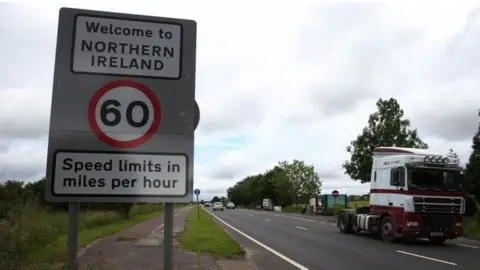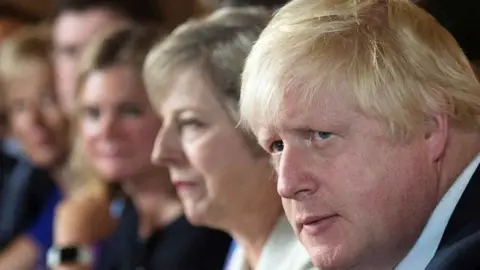No 10 insists no hard border in Ireland after Johnson comments
 PA
PADowning Street has dismissed any prospect of a return to a "hard border" on the island of Ireland after Brexit.
It followed the leak of a letter from Boris Johnson in which he appeared to contemplate future customs border checks after the UK leaves the EU.
In the letter, obtained by Sky News, the foreign secretary tells Theresa May 95% of traffic would still pass unchecked if there was a hard border.
It comes as the EU is set to publish a draft of its Brexit withdrawal treaty.
The 120-page document, to be unveiled on Wednesday, will refer to three possible options for avoiding physical infrastructure on the Irish border but the only one to be fleshed out will be the government's least-favourite: Northern Ireland staying aligned with European rules and regulations.
The document, marking another major milestone on the UK's road to Brexit, will encapsulate in legally binding text agreements already reached on Ireland, citizens' rights and the UK's so-called "divorce bill".
The BBC's Brussels reporter Adam Fleming said it would form the basis of further negotiations with the UK in areas like the transition and could still be tweaked by the 27 remaining member states.
According to reports by Irish broadcaster RTE, the text - which EU negotiator Michel Barnier has said will not contain any surprises - will say that Northern Ireland may be considered part of European Union customs territory after Brexit, alluding to a single regulatory space on the island of Ireland with no internal barriers.
'Exaggerated impression'
Earlier on Tuesday, the foreign secretary was criticised by opponents for suggesting in a BBC interview the issue of the border could be managed as easily as London's congestion charging zone.
In his letter to the prime minister, Mr Johnson seeks to play down the "exaggerated impression" of "how important checks are" at EU external borders.
He also appears to contemplate a hard border between Northern Ireland and the Republic of Ireland, writing: "Even if a hard border is reintroduced, we would expect to see 95% + of goods pass the border [without] checks."

Loose lips?
 Reuters
ReutersBy Iain Watson, BBC political correspondent
He may have thought he was being helpful. Boris Johnson was offering his views on how to deal with the thorny issue of the Irish border.
But today he seemed to put both feet in it.
First foot. He seemed to trivialise centuries of Irish history by suggesting the status of the Irish border was no more important than a borough boundary in London, where the congestion charge is policed electronically.
Second, while his paper didn't contemplate new infrastructure between Northern Ireland and the Republic he used the potentially toxic phrase "if" in connection with a hard border.
This allowed opponents to suggest he - maybe even the government - was contemplating a regime of border checks that would be anathema to republicans and nationalists - and why No 10 moved so quickly to confirm the policy hadn't changed.
As the old wartime adage goes "Loose Lips Sink Ships".
Mr Johnson's loose language is unlikely to cost lives but could erode much needed goodwill just as the EU draws up a legal text on the post-Brexit Irish border which will also prove controversial.

Following the letter's emergence, Labour called for Mr Johnson - one of the leading Brexiteers in the cabinet - to be dismissed "before he can do any more damage".
"This man's ego, and his Brexit at any cost strategy cannot be allowed to jeopardise peace," said shadow Northern Ireland secretary Owen Smith.
A spokesman for Mr Johnson said the letter was "designed to outline how a highly facilitated border would work and help to make a successful Brexit".
"The letter points out there is a border now, and the task the (cabinet Brexit) committee face is stopping this becoming significantly harder," he said.
"It shows how we could manage a border without infrastructure or related checks and controls while protecting UK, Northern Ireland, Irish and EU interests."
He added: "We will not accept any physical infrastructure at the border, and will instead seek alternatives that allow us to leave the customs union and take back control of our money, borders, laws and trading policy."
No 10 said it had made it clear "on numerous occasions" the UK government will not contemplate a hard border after the UK leaves the EU on 29 March 2019.
